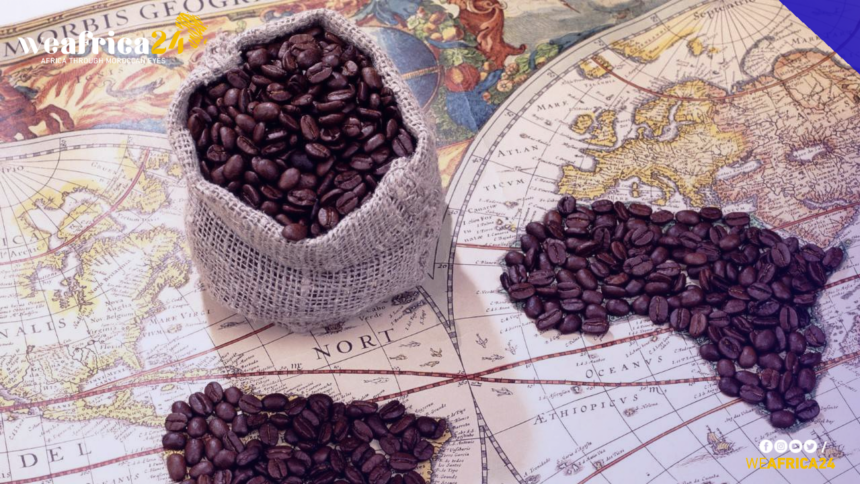On the occasion of International Coffee Day, let’s take a moment to appreciate not only the aroma and flavor that awaken our senses every morning, but also the captivating history that is woven into every cup of coffee.
From its discovery in Ethiopia to its becoming a global phenomenon, coffee has been an integral part of human culture, commerce, and social rituals for centuries.
The Origin: Ethiopia’s Gift to the World
Coffee has an interesting history that starts in Ethiopia, where a goat herder named Kaldi discovered its energizing properties. Legend has it that Kaldi noticed his goats became unusually animated after eating the red berries of a particular shrub.
Kaldi tried the berries himself and found that they gave him newfound vitality, he shared his discovery with nearby monks who found that a brew made from the beans provided a sustained energy that helped them during long hours of prayer.
Travelers and traders soon caught wind of this beverage, and it made its way to Yemen in the 15th century, where the beans were cultivated, roasted, and brewed into the world’s first coffee. The word “coffee” itself is believed to have originated from the Arabic term “qahwa” in Yemen.
The Coffeehouses of Yemen: Birthplace of the Café Culture
Yemen quickly became the epicenter of coffee culture. Coffeehouses, known as “qahveh khaneh,” emerged as vibrant social hubs.
People gathered to engage in conversation, listen to music, and indulge in the aromatic brew. Coffeehouses became centers of intellectual exchange, where poets, philosophers, and scholars exchanged ideas while sipping on cups of this newfound elixir.
Yemen held a virtual monopoly on coffee production, protecting the prized commodity by prohibiting the export of fertile coffee beans.
The Coffee Trade.. From Yemen to Europe
Despite Yemen’s efforts, coffee’s intoxicating aroma was too enticing to remain a secret. In the 17th century, European traders brought coffee back to their home countries, introducing it to the bustling coffeehouses of Venice, Vienna, and London.
These establishments mirrored their Yemeni predecessors, serving as forums for intellectual discourse and community gatherings. In England, coffeehouses earned the nickname “Penny Universities” because for the price of a cup of coffee, one could engage in enlightening discussions.
Coffee Spreads Worldwide
The appeal of coffee continued to grow, eventually crossing the Atlantic to the New World. It found fertile ground in the Caribbean and South America, where coffee plantations flourished. Brazil, in particular, became a coffee powerhouse, with its rich soil and ideal climate fostering the growth of Arabica beans.
Meanwhile, coffee’s journey eastward took it to Southeast Asia, where countries like Indonesia and Vietnam became significant coffee producers. Today, Vietnam is the world’s second-largest coffee exporter, known for its robusta beans.
The Coffee Revolution.. Specialty Coffee and Fair Trade
While coffee has become an international staple, it has also experienced a revolution in recent decades. The emergence of the specialty coffee movement has transformed how we perceive and consume coffee. This movement emphasizes the unique flavors and profiles of different coffee regions and promotes sustainability and ethical sourcing practices. Small-batch roasters and artisanal coffee shops have thrived, offering coffee enthusiasts an array of choices beyond the traditional brew.
Additionally, the fair trade movement has worked to ensure that coffee growers receive fair compensation for their labor, addressing the economic disparities that often plague the industry.
Today, the coffee industry continues to evolve. Technological advancements in coffee production, from precision roasting to espresso machines, have elevated the coffee experience. However, these innovations are paired with a growing emphasis on sustainability. Coffee producers are increasingly adopting eco-friendly farming practices, while consumers are seeking out ethically sourced, environmentally friendly coffee.
A Brew Steeped in History and Promise
As we savor our favorite coffee blend on International Coffee Day, let’s remember that each sip carries with it a rich history of discovery, culture, and human connection. Coffee has transcended continents, sparking creativity, conversation, and community.
It remains not just a beverage but a symbol of shared moments and aspirations for a brighter, more equitable future in the coffee-growing regions of the world. Whether you enjoy a classic espresso or an artisanal pour-over, coffee’s journey from ancient Ethiopia to the cafes of today is a testament to its enduring appeal and global significance. So, raise your cups in celebration.







